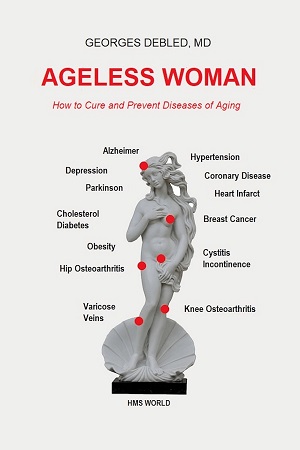ALZHEIMER
'S
DISEASE
Understanding
diseases of aging:
ageless woman
|
Hopes that will not be disappointed to prevent
Alzheimer's disease (Debled G.)
-
The clinical studies
carried out to date are remarkable. They
highlight the important impact of testosterone
on Alzheimer's disease (1-2-3-4-5).
-
The role of tetosterone
and androgens to treat and prevent Alzheimer's
disease would require a more
detailed
approach.
-
It seems useful to draw
attention to the fact that clinical studies are
often based on the study of the level of
testosterone in the blood, which does not allow
a precise idea of the androgen metabolism.
Future studies could draw inspiration from this
because
evaluation of the daily production of androgens
should be considered.
-
A blood testosterone
level of 1500 ng / 100 ml may correspond to a
pathology (in man). On the other hand, a level
of 350ng / 100 ml (in man) can correspond to a
non pathological metabolism not requiring
hormonal supplementation.
-
Clinical studies are
often done in a double-blind manner, which gives
a general idea of the results by eliminating
the subjective factors. They are very useful in
guiding research.
We would like to draw attention to the hormonal
uniqueness of each person with Alzheimer's
disease. To understand this hormonal
singularity, a detailed
study of the
androgenic metabolism should be carried out
in each patient.
-
The singular study
of androgens in each person with Alzheimer's
disease makes it possible to prescribe a precise
treatment (testosterone is not the only androgen
available) and well dosed.
The administration of a standard dose of
testosterone is often proposed to treat each
patient. The singularity of the biological
results for each patient implies a singular
treatment by the androgens or a possible
singular contraindication to this treatment.
Failing this, a single standard dose of
testosterone can lead to undesirable effects
(7).
-
The disappointments
(6) and undesirable effects (7) caused by
testosterone could be avoided by a better
knowledge of androgen therapy. Considering a
standard dose of testosterone for each patient
is unreasonable (diabetes or thyroid
insufficiency are not treated with a standard
dose of insulin or a standard dose of
thyroxine).
-
To resolve apparent
contradictions in testosterone therapy, clinical
studies and future treatments should be based on
a detailed
analysis of androgen metabolism in people
with Alzheimer's disease. They will probably
better understand the treatment and hormonal
prevention of this disease.
-
Regularization of
androgen metabolism should occur at the
onset of early symptoms of Alzheimer's
disease and further upstream as soon as the
first symptoms of
menopausal
disease appear.
|
***
Hopes uncovered - news as of November 23,
2016. pdf
What are
the pathological lesions of the brain in
Alzheimer's disease?
What can
be the mechanism of this degeneration ?
Testosterone production decreases with age
in men and women
The androgen
production chain in women
Recent
and decisive scientific discoveries
Hopes that will
not be disappointed to prevent Alzheimer's
disease
Understanding
diseases of aging:
ageless woman
Bibliography
